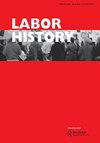‘They were like soldiers.’ The case of the Polish builders in Czechoslovakia and their perception by Czechs (1967-1990)
IF 0.7
4区 管理学
Q1 HISTORY
引用次数: 0
Abstract
ABSTRACT This article deals with Polish construction companies in Czechoslovakia during the last two decades of state socialism. Although Czechoslovakia became the largest importer of Polish construction services in the world, this aspect of the relations between the two countries remains almost entirely unknown. I am seeking the answers to two questions. First, why did Czechoslovak leaders grant the Poles such a large share of crucial investments in the modernization of the country, even though the services were not cheap? Second, how did the local population integrate encounters with foreign builders into their working-class culture and their ethnic stereotype of the Poles? I argue that Polish construction companies, operating under de facto market conditions, achieved significantly better and faster results than their Czechoslovak counterparts. In the second part of the article, I explain the paradox of why the Czech population held the Polish builders in high esteem while simultaneously rejecting them as role models. I argue that the Poles were discredited because they seriously violated the Czechs’ deep-held sense of egalitarian values. Yet in their interactions both Czechs and Poles defended their working-class values and maintained a perceived moral superiority over each other and the communist regime.“他们就像士兵一样。”捷克斯洛伐克的波兰建设者及其捷克人的看法(1967-1990)
本文讨论了捷克斯洛伐克国家社会主义过去二十年中的波兰建筑公司。虽然捷克斯洛伐克成为世界上波兰建筑服务的最大进口国,但两国关系的这一方面仍然几乎完全不为人所知。我在寻找两个问题的答案。首先,为什么捷克斯洛伐克领导人在国家现代化的关键投资中给予波兰人如此大的份额,即使这些服务并不便宜?其次,当地人如何将与外国建筑商的接触融入到他们的工人阶级文化和对波兰人的种族刻板印象中?我认为,在实际市场条件下运作的波兰建筑公司比捷克斯洛伐克同行取得了更好、更快的成果。在文章的第二部分,我解释了为什么捷克人高度尊重波兰建设者,同时又拒绝他们作为榜样的悖论。我认为波兰人之所以名誉扫地,是因为他们严重违反了捷克人根深蒂固的平等主义价值观。然而,在他们的互动中,捷克人和波兰人都捍卫了自己的工人阶级价值观,并保持了对彼此和共产主义政权的道德优越感。
本文章由计算机程序翻译,如有差异,请以英文原文为准。
求助全文
约1分钟内获得全文
求助全文
来源期刊

Labor History
Multiple-
CiteScore
1.00
自引率
28.60%
发文量
44
期刊介绍:
Labor History is the pre-eminent journal for historical scholarship on labor. It is thoroughly ecumenical in its approach and showcases the work of labor historians, industrial relations scholars, labor economists, political scientists, sociologists, social movement theorists, business scholars and all others who write about labor issues. Labor History is also committed to geographical and chronological breadth. It publishes work on labor in the US and all other areas of the world. It is concerned with questions of labor in every time period, from the eighteenth century to contemporary events. Labor History provides a forum for all labor scholars, thus helping to bind together a large but fragmented area of study. By embracing all disciplines, time frames and locales, Labor History is the flagship journal of the entire field. All research articles published in the journal have undergone rigorous peer review, based on initial editor screening and refereeing by at least two anonymous referees.
 求助内容:
求助内容: 应助结果提醒方式:
应助结果提醒方式:


